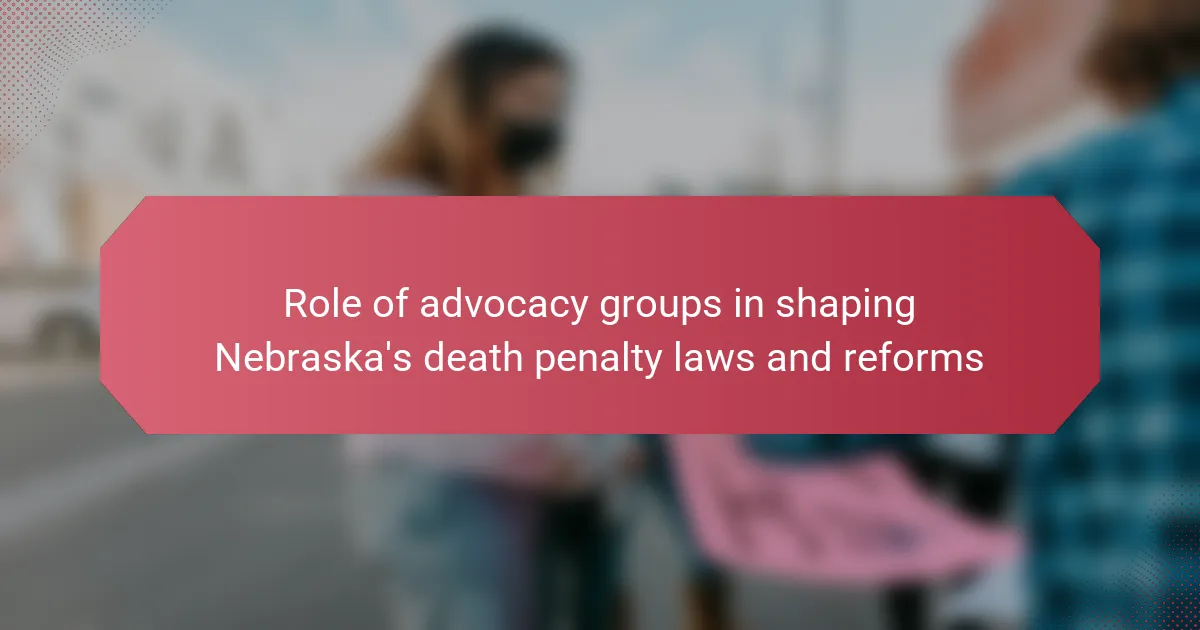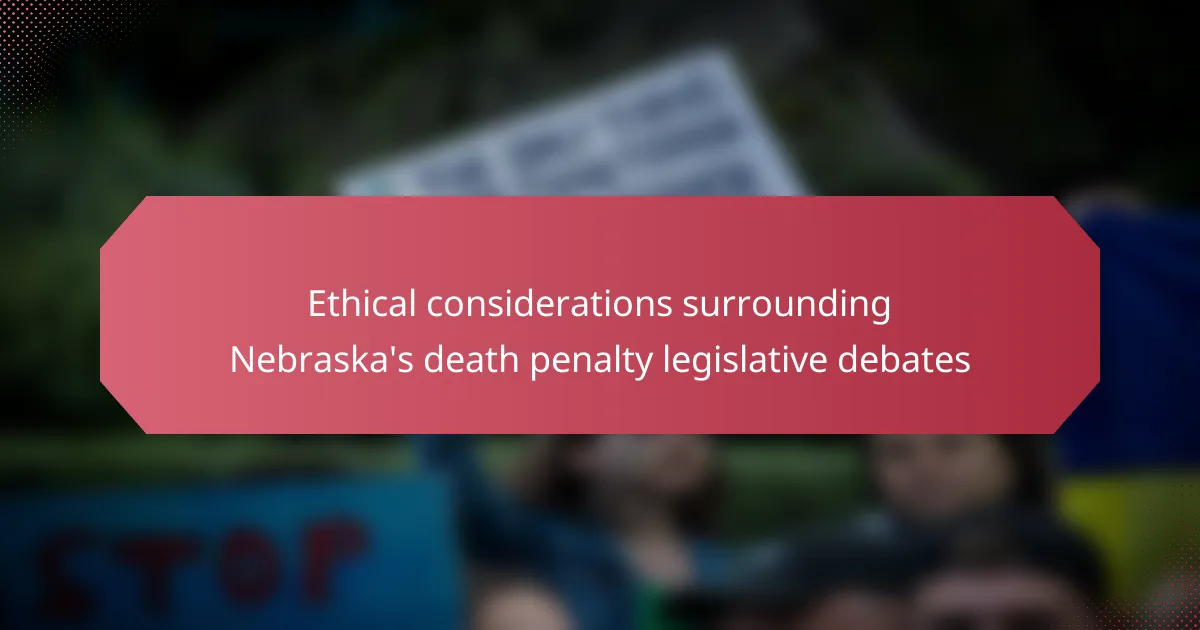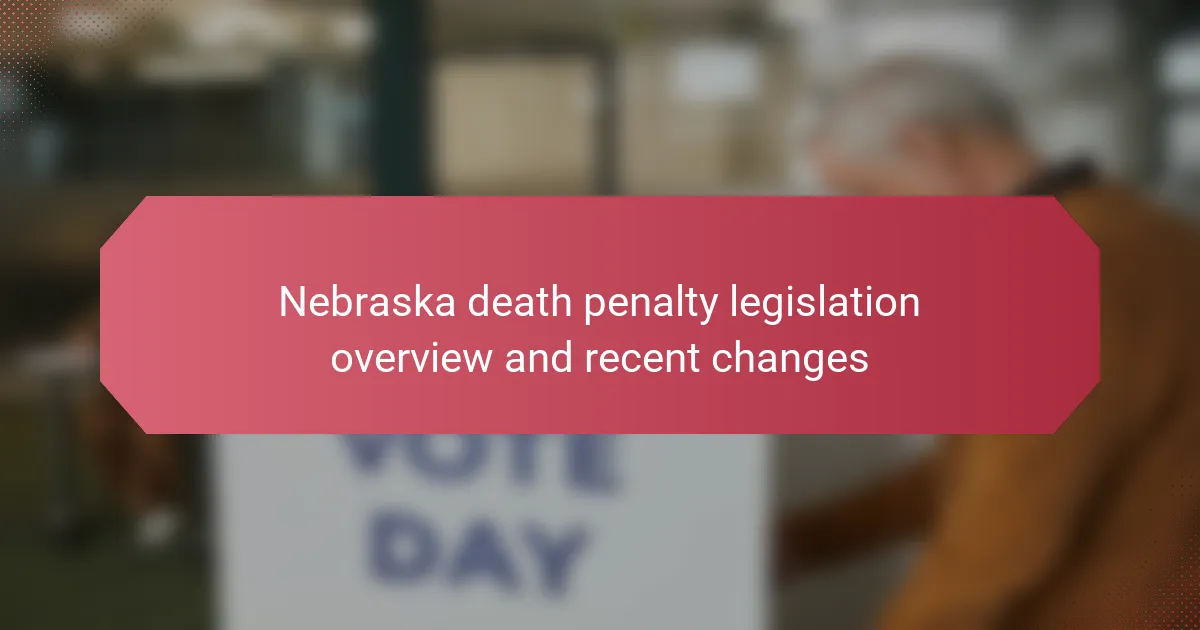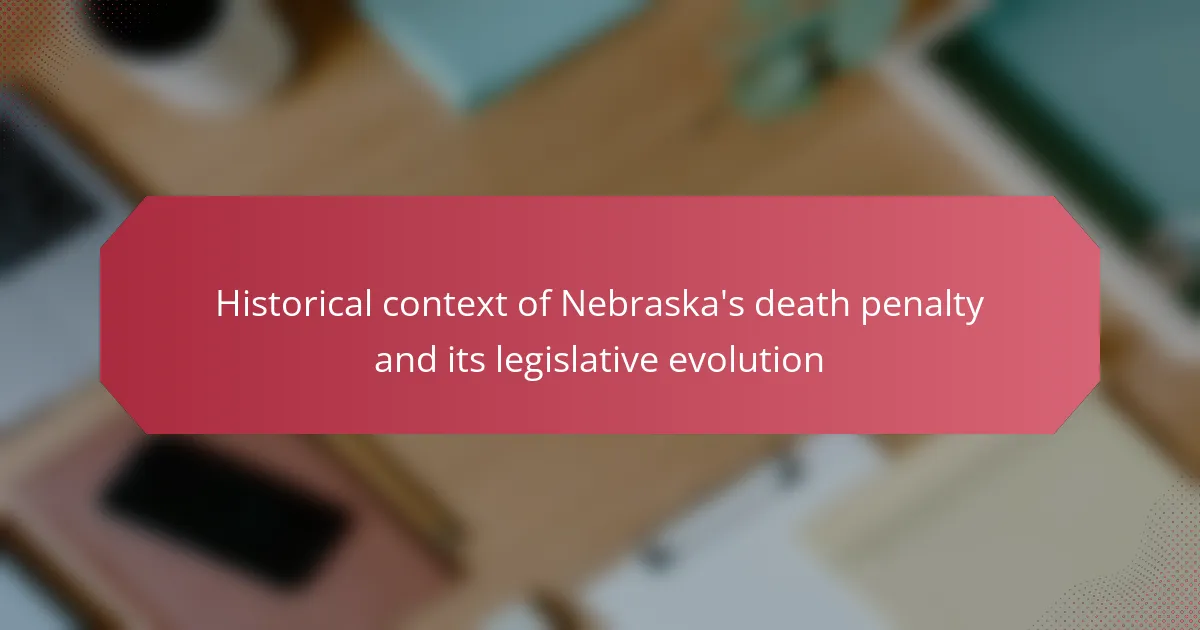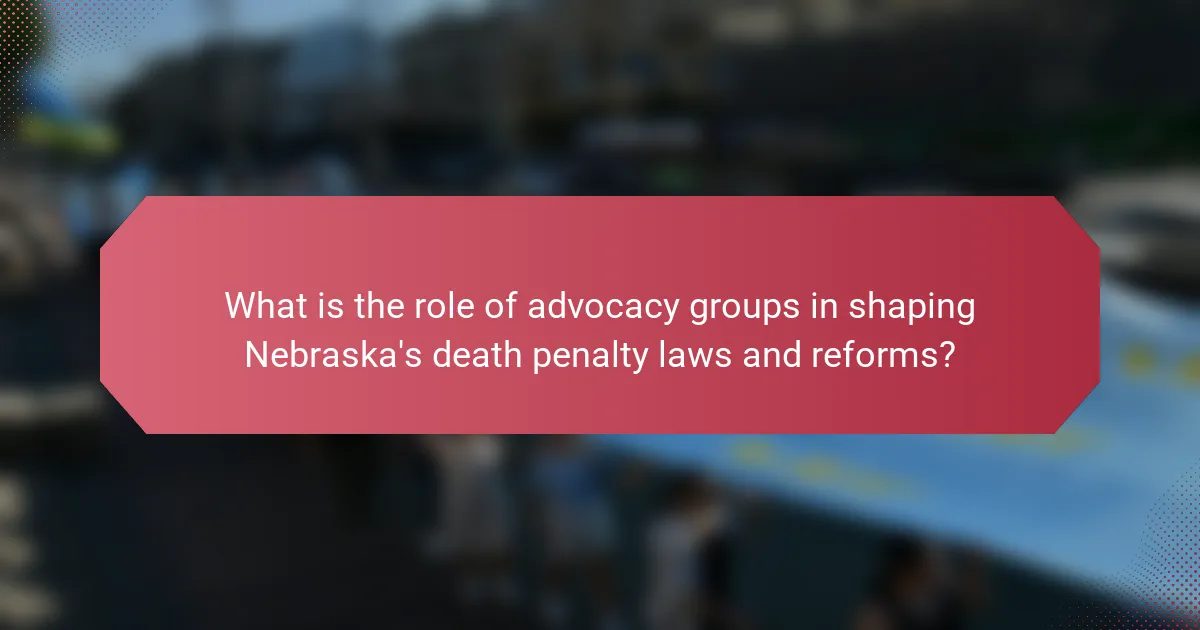
What is the role of advocacy groups in shaping Nebraska’s death penalty laws and reforms?
Advocacy groups play a significant role in shaping Nebraska’s death penalty laws and reforms. They raise awareness about the moral, legal, and financial implications of capital punishment. These groups often mobilize public opinion through campaigns and education. They also engage in lobbying efforts to influence lawmakers. In Nebraska, organizations like the ACLU and Nebraskans for Alternatives to the Death Penalty have been instrumental in advocating for repeal and reform. Their efforts contributed to the state legislature’s historic vote to abolish the death penalty in 2015. However, this decision was later reversed by a referendum in 2016. Advocacy groups continue to push for reforms, emphasizing issues like wrongful convictions and racial disparities in sentencing. Their sustained efforts highlight the ongoing debate surrounding capital punishment in Nebraska.
How do advocacy groups influence legislative processes regarding the death penalty?
Advocacy groups influence legislative processes regarding the death penalty by mobilizing public opinion and lobbying lawmakers. They conduct campaigns to raise awareness about the moral and ethical implications of capital punishment. These groups often provide research and data to support their positions. For example, they may present studies showing wrongful convictions or the financial costs of the death penalty. Advocacy groups also organize protests and events to draw media attention. This public visibility can pressure legislators to reconsider existing laws. Additionally, they build coalitions with other organizations to strengthen their impact. Historical instances, such as the repeal of the death penalty in Nebraska in 2015, illustrate their effectiveness in shaping policy.
What strategies do advocacy groups use to promote their positions on the death penalty?
Advocacy groups use various strategies to promote their positions on the death penalty. They conduct public awareness campaigns to educate the public about their stance. These campaigns often include distributing literature, organizing events, and utilizing social media. Advocacy groups also engage in lobbying efforts to influence lawmakers directly. They may present research and data to support their arguments. Collaborating with other organizations amplifies their message and reach. Legal challenges are another strategy, aiming to change laws or practices through the courts. These combined efforts aim to shift public opinion and policy regarding the death penalty.
How do advocacy groups mobilize public opinion on death penalty issues?
Advocacy groups mobilize public opinion on death penalty issues through strategic campaigns and public engagement. They utilize social media to disseminate information and rally support. These groups often conduct awareness programs to educate the public about the implications of the death penalty. They also organize protests and events to draw media attention. Research indicates that grassroots movements can significantly influence public sentiment. For instance, the American Civil Liberties Union has documented shifts in public opinion following targeted campaigns. Additionally, they often collaborate with influential figures to amplify their message. By sharing personal stories and data, advocacy groups create emotional connections that resonate with the public.
What are the key advocacy groups involved in Nebraska’s death penalty debates?
The key advocacy groups involved in Nebraska’s death penalty debates include the ACLU of Nebraska, Nebraskans for Alternatives to the Death Penalty, and the Nebraska Conference of Catholic Bishops. The ACLU of Nebraska advocates against the death penalty, citing issues of fairness and justice. Nebraskans for Alternatives to the Death Penalty promotes alternatives to capital punishment, arguing for more humane solutions. The Nebraska Conference of Catholic Bishops opposes the death penalty on moral grounds, emphasizing the sanctity of life. These groups play significant roles in shaping public opinion and influencing legislative changes regarding the death penalty in Nebraska.
What missions and goals do these advocacy groups pursue?
Advocacy groups focused on Nebraska’s death penalty laws pursue missions aimed at reforming or abolishing capital punishment. They seek to raise awareness about the moral and ethical implications of the death penalty. These groups aim to influence legislation and public opinion through education and outreach. They often work to highlight issues such as wrongful convictions and racial bias in sentencing. Advocacy groups also strive to support victims’ families by providing resources and alternative justice solutions. Their ultimate goal is to promote a justice system that is fair, equitable, and humane. By mobilizing community support, these groups aim to effect legislative change regarding the death penalty in Nebraska.
How do these groups collaborate or compete with each other?
Advocacy groups in Nebraska’s death penalty debate often collaborate and compete in various ways. Collaboration occurs when groups with shared goals unite for campaigns or legislative efforts. For example, organizations opposing the death penalty may join forces to promote abolition bills. They share resources, information, and strategies to strengthen their impact.
Competition arises when groups have differing views on the death penalty. Pro-death penalty advocates and abolitionists often clash in public forums and legislative sessions. Each group seeks to influence lawmakers and public opinion to support their stance. They may engage in lobbying, media campaigns, and grassroots mobilization to gain traction.
The Nebraska Coalition for the Death Penalty and the Nebraska ACLU exemplify this dynamic. The Coalition advocates for maintaining capital punishment, while the ACLU pushes for its abolition. Their differing objectives lead to competing narratives in the media and legislative processes. This interplay of collaboration and competition shapes the ongoing discourse surrounding death penalty laws in Nebraska.
What historical context has shaped the role of advocacy groups in Nebraska’s death penalty reforms?
Advocacy groups in Nebraska’s death penalty reforms have been shaped by historical events and societal shifts. The 1972 U.S. Supreme Court decision in Furman v. Georgia led to a temporary halt of the death penalty nationwide. This prompted advocacy groups in Nebraska to mobilize against capital punishment. In 2015, Nebraska’s legislature voted to abolish the death penalty, influenced by growing public opposition and moral arguments from advocacy organizations. Additionally, the rise of the Innocence Project highlighted wrongful convictions, further energizing advocacy efforts. These groups have consistently pushed for reforms, emphasizing human rights and the potential for rehabilitation. Their role has been pivotal in shaping legislative actions and public perception regarding the death penalty in Nebraska.
What major events have influenced advocacy group activities in this area?
The major events influencing advocacy group activities in Nebraska’s death penalty laws include legislative changes and public referendums. In 2015, the Nebraska legislature voted to repeal the death penalty, a significant shift in policy. This repeal was driven by advocacy groups highlighting moral and financial concerns regarding capital punishment. In 2016, a referendum reinstated the death penalty, reflecting public support for its continuation. Advocacy groups mobilized to both support and oppose this referendum, demonstrating their active involvement in shaping public opinion. Additionally, high-profile cases and national debates on the death penalty have further galvanized advocacy efforts in Nebraska.
How have public attitudes towards the death penalty changed over time in Nebraska?
Public attitudes towards the death penalty in Nebraska have shifted significantly over time. Historically, support for the death penalty was strong, particularly in the late 20th century. However, recent years have shown a decline in public support. A 2016 poll indicated that only 57% of Nebraskans supported capital punishment, down from 75% in 2000. Advocacy groups have played a crucial role in this change, highlighting issues such as wrongful convictions and the costs associated with the death penalty. Legislative actions, including the repeal of the death penalty in 2015 and its subsequent reinstatement, reflect these changing attitudes. The influence of advocacy groups has contributed to a growing conversation about morality and justice in relation to capital punishment in Nebraska.
How do advocacy groups address ethical considerations surrounding the death penalty?
Advocacy groups address ethical considerations surrounding the death penalty by promoting human rights and justice reforms. They argue that the death penalty is a violation of the right to life. Many groups highlight the risk of wrongful convictions, which can lead to irreversible consequences. They also emphasize the disproportionate impact on marginalized communities. Research indicates that racial bias influences sentencing outcomes in capital cases. Advocacy groups often provide legal support to individuals on death row. They engage in public education campaigns to raise awareness about these issues. Additionally, they lobby for legislative changes to abolish or reform the death penalty. Through these actions, advocacy groups aim to shift public perception and influence policy decisions.
What ethical arguments do advocacy groups present against the death penalty?
Advocacy groups present several ethical arguments against the death penalty. They argue that it violates the fundamental right to life. This perspective is rooted in the belief that all human life has inherent value. Many groups assert that the death penalty is an irreversible punishment. Wrongful convictions can lead to the execution of innocent individuals. Statistics indicate that a significant number of death row inmates have been exonerated. Additionally, advocacy groups highlight the discriminatory application of the death penalty. Racial and socioeconomic biases often influence sentencing outcomes. They also argue that the death penalty does not effectively deter crime. Research shows that states without the death penalty often have lower murder rates. Lastly, some groups emphasize the moral implications of state-sanctioned killing. They contend that it undermines the societal commitment to justice and rehabilitation.
How do advocacy groups justify their support for or against capital punishment?
Advocacy groups justify their support for or against capital punishment through ethical, legal, and social arguments. Supporters often argue that capital punishment serves as a deterrent to crime. They cite studies suggesting that states with the death penalty have lower murder rates. Additionally, they believe it provides justice for victims and their families. Opponents argue that capital punishment is inhumane and violates human rights. They highlight wrongful convictions and the risk of executing innocent people. Statistics show that a significant number of death row inmates are exonerated. Advocacy groups also emphasize the disproportionate impact on marginalized communities. They point to racial and economic disparities in sentencing. Overall, these groups use a combination of moral reasoning, legal precedents, and statistical evidence to support their positions.
What challenges do advocacy groups face in influencing death penalty laws in Nebraska?
Advocacy groups face significant challenges in influencing death penalty laws in Nebraska. Legislative opposition is a primary hurdle, as many lawmakers support the death penalty. Public opinion also complicates efforts, with mixed views on capital punishment among residents. Limited financial resources restrict advocacy groups’ ability to campaign effectively. Additionally, the political climate can be unfavorable, with strong lobbying from pro-death penalty organizations. Legal complexities surrounding death penalty cases further hinder advocacy efforts. Finally, misinformation about the death penalty can mislead public perception and stall reform initiatives. These factors collectively impede advocacy groups’ influence on death penalty legislation in Nebraska.
What legal hurdles impede advocacy efforts for death penalty reforms?
Legal hurdles that impede advocacy efforts for death penalty reforms include existing state statutes and constitutional provisions. Many states have laws that firmly establish the death penalty, making reforms challenging. Advocacy groups often face resistance from lawmakers who support these statutes. Additionally, constitutional challenges can arise regarding due process and equal protection. Legal precedents also complicate efforts, as courts may uphold existing death penalty laws. Public opinion can further influence legislative action, often favoring the status quo. These factors create a complex legal environment for advocates seeking reform.
How do political dynamics affect the work of advocacy groups in Nebraska?
Political dynamics significantly influence the work of advocacy groups in Nebraska. Shifts in political leadership can alter priorities and funding for issues related to the death penalty. For example, when the governor’s office changes parties, advocacy groups may find new opportunities or challenges in pushing for reforms. Legislative composition also affects the passage of bills related to the death penalty. A majority in favor of reform can facilitate the introduction of new legislation. Conversely, a hostile political environment can hinder advocacy efforts. Public opinion, shaped by political discourse, impacts the strategies of these groups. Advocacy organizations must adapt their messaging based on the prevailing political climate to effectively engage stakeholders.
What recent reforms have been influenced by advocacy groups in Nebraska’s death penalty laws?
Recent reforms in Nebraska’s death penalty laws have been significantly influenced by advocacy groups. These groups have campaigned for the abolition of the death penalty. Their efforts culminated in the successful passing of Legislative Bill 268 in 2015. This bill led to the repeal of the death penalty in Nebraska. Advocacy groups highlighted moral, ethical, and financial concerns associated with capital punishment. They provided data showing the high costs of death penalty cases compared to life sentences. Their influence is evident in the increasing public support for reform. Polls indicate a shift in public opinion towards alternative sentencing options.
What specific changes in legislation can be attributed to advocacy efforts?
Advocacy efforts have led to significant changes in Nebraska’s death penalty legislation. In 2015, the Nebraska legislature voted to repeal the death penalty, driven by advocacy groups highlighting moral and fiscal concerns. This repeal was a direct result of campaigns by organizations such as the ACLU of Nebraska and Nebraskans for Alternatives to the Death Penalty. In 2016, a voter referendum attempted to reinstate the death penalty but was ultimately unsuccessful, demonstrating the impact of sustained advocacy. The repeal was influenced by arguments regarding wrongful convictions and the high costs associated with capital punishment. These advocacy efforts have effectively shifted public perception and legislative priorities surrounding the death penalty in Nebraska.
How have these reforms impacted the application of the death penalty in Nebraska?
Reforms in Nebraska have significantly reduced the application of the death penalty. The state has seen a moratorium on executions since 2015. Advocacy groups have played a crucial role in pushing for legislative changes. These groups have raised awareness about wrongful convictions and the costs associated with capital punishment. In 2017, the Nebraska legislature voted to abolish the death penalty, although the decision was later overturned by a referendum. The reforms have led to a decline in death sentences. Fewer individuals are currently on death row compared to previous years. Overall, advocacy efforts have shifted public perception and influenced policy changes regarding the death penalty in Nebraska.
What best practices can advocacy groups adopt to effectively influence death penalty reforms?
Advocacy groups can effectively influence death penalty reforms by employing strategic communication, building coalitions, and engaging in grassroots mobilization. Strategic communication involves clearly articulating the moral, legal, and social arguments against the death penalty. For example, highlighting wrongful convictions and racial disparities can resonate with the public. Building coalitions with other organizations amplifies the advocacy group’s reach and credibility. Collaborating with civil rights groups and faith-based organizations can strengthen the movement. Grassroots mobilization empowers local communities to advocate for change. Organizing rallies, petitions, and public forums raises awareness and encourages community involvement. Research shows that states with strong grassroots movements have seen significant reforms. For instance, California’s Proposition 62 campaign in 2016 demonstrated the power of grassroots efforts in influencing public opinion on the death penalty.
The main entity of this article is advocacy groups and their influence on Nebraska’s death penalty laws and reforms. The article examines how these groups, including the ACLU and Nebraskans for Alternatives to the Death Penalty, have shaped public opinion and legislative processes through campaigns, lobbying, and education. It highlights key events, ethical arguments, and the challenges these organizations face in promoting reforms. Additionally, the article discusses the historical context of advocacy efforts, recent legislative changes, and best practices for effectively influencing death penalty policies in Nebraska.
